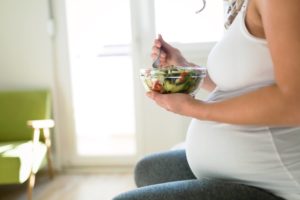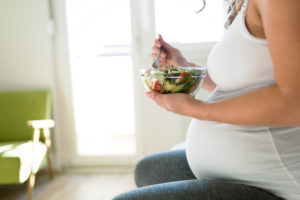
What should birth mothers know about prenatal nutrition? A healthy pregnancy depends on several lifestyle factors, including what you eat. Whether your pre-pregnancy diet was less than nutritious or you just want to amp up your healthy eating plan, take a look at the top questions birth mothers have about their diet.
Why Is What You Eat During Pregnancy Important?
Nutrition is always important. But in pregnancy, eating healthy takes on a whole new meaning. Now that you’re pregnant, you’re eating for two. This means whatever you eat helps your baby to grow and develop.
Not only does the food you eat help your baby, it also keeps you healthy. Pregnancy puts new demands on your body. This makes it essential to get the right types of nutrients and the right amount of calories.
Does Diet During Pregnancy Mean Weight Loss?
The word diet has different meanings. In your pre-pregnancy days, you may have thought of diet as something you did or a plan to lose weight. Even though diet can mean an approach to weight loss, it can also mean the overall or your general food intake. When you hear the word pregnancy diet, think of the way you eat — not weight loss.
Unless your doctor specifically instructs otherwise, you should never attempt to lose weight or follow a restrictive weight loss plan during pregnancy. A weight loss diet can lead to nutritional deficiencies. Most women need to increase their calorie intake during pregnancy.
According to the U.S. Office of Disease Prevention and Health Promotion (OASH), most pregnant women should eat 340 extra calories per day in their second trimester and 450 extra calories per day in their third trimester.
Some women may need either a lower or higher additional calorie intake, depending on their pre-pregnancy starting weight. Your medical provider can help you to find a daily calorie intake number that matches your individual needs.
What Should You Eat During Pregnancy?
There is no universal or standard pregnancy diet. Like calorie intake, your doctor, midwife, or other medical provider may need to help you create a customized diet plan that is based on your specific health and pregnancy needs.
According to the American College of Obstetricians and Gynecologists (ACOG), folic acid, vitamin D, choline, iron, calcium, omega-3 fatty acids, vitamin C, and B vitamins are important during pregnancy for both the mother and the developing baby.
You can get some of these vitamins and minerals in prenatal supplements that your medical provider prescribes. But you should also get key nutrients from healthy foods. These include calcium-rich options such as yogurt, milk, cheese, and leafy green vegetables. Pregnant birth mothers can get the iron they need by eating lean red meat, dried beans/peas, iron-fortified bread or cereal, poultry, and fish.
Sources of choline include milk, soy-based foods, eggs, and peanuts. Vitamin C-rich diet options include citrus fruits — such as oranges or grapefruit — tomatoes, and broccoli. You can get vitamin D from fortified milk and some types of fatty fish sources. Vitamin A-rich foods include leafy greens, sweet potatoes, and carrots.
Do Pregnant Women Need Extra Folic Acid?
Folic acid is a nutrient that you may have heard a lot about—especially now that you’re pregnant. It helps fetal neural tube development and can reduce the risk of birth defects such as spina bifida. The ACOG notes that most pregnant people need 600 micrograms of folic acid daily.
Foods that are rich in folic acid include enriched bread, fortified cereal, peanuts, dark leafy greens, beans, and orange juice. Even though you may eat these types of folic acid-containing foods regularly, you will still need to take a supplement.
Can You Substitute Supplements For Food?
You should not substitute supplements like your prenatal vitamins for foods and beverages. Supplements do have some of the vitamins and minerals you need during pregnancy, but lack the calories necessary to fuel your body.
Can You Take the Same Supplements During Pregnancy That You Took Before?
The answer to this question depends on the supplements and your health & pregnancy needs. Talk to your medical provider before you take any vitamin, mineral, supplement, or natural remedy. Your doctor or midwife will help you to understand what is and isn’t safe to take during pregnancy.
What Shouldn’t You Eat During Pregnancy?
Some foods provide empty calories, too much fat, or are filled with chemical preservatives. These won’t help you to stay healthy now or after your pregnancy. Don’t eat an excessive amount of sugar-packed foods. While you can treat yourself to a sweet every so often, limit your intake to avoid excess dietary sugar.
You should also limit your caffeine intake — talk to your doctor about caffeine intake for your situation, though they likely will recommend occasional intake at most. In addition, avoid alcohol or any fish that contains high levels of mercury — such as king mackerel, tilefish, or swordfish.
Now that you know more about a healthy pregnancy, do you want to learn about your adoption options? Contact Arizona Adoption Help for more information.



